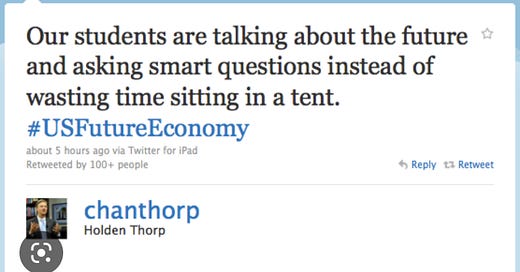Twitter is dead, long live Twitter
The platform is not much fun anymore, but still has a large community
Twitter has played an outsized role in my life. When I was chancellor at UNC-Chapel Hill, I endured and struggled with an athletics scandal that was started with a tweet from one of our players that attracted the attention of the NCAA. Ironically, the extra benefits the NCAA took an interest in are now legal. When we went before the NCAA committee on infractions, we devoted most of the hearing to whether member schools were obligated to monitor the Twitter accounts of their players. (There was a lot of speculation that we spent all that time talking about things more intimately related to UNC’s case.)
I also sent out a famous tweet of trash talk on the day of the UNC/Duke game that was viewed as conduct unbecoming a chancellor. I deleted it (and gave what the HuffPost called a ‘tepid apology’), but it lives on as a screenshot. My position on Duke University has always been one of admiration of everything except their basketball program. That is unchanged.
When I became the editor-in-chief of Science, Twitter became a very important communication tool, especially during the pandemic. I was salty about a lot of stuff and got a decent number of followers, had some tweets that got a lot of engagement, and was able to drive folks to my content. I had one of the ‘good’ blue checks back in the day.
When Elon Musk took over, I started getting less engagement and had to put up with all of the garbage he encourages. Transphobic, racist, sexist tweets are no fun to look at. And the thrill of going viral on the platform is basically gone, presumably because folks like me are deemphasized on the platform (and no $8, no way). The thing that made Twitter great was the fact that some relatively unknown person could send out a brilliant tweet and millions of people could see it. No more.
Still, I had a hard time looking away from Twitter as a source of information. All of my favorite news sources and journalists were there. I couldn’t quit it. Until now. Threads is at least as addictive, and most of my favorite folks have congregated there. I have no idea if the scientific community will reassemble on Threads in the same way, but a lot of my usual follows from the pandemic are there. I put it in the same place on my Home Screen as where the Twitter app was, and now I can obsessively look at it to see what is going on in the world in the same way I always did with Twitter. I’m betting on Zuck to win the screen time war - his hedgehog concept is getting people addicted to websites. Elon has so far only shown how to get people to leave, especially advertisers.
Of course, I’m not going to completely quit Twitter. Some folks have done that, but most have just deemphasized it. Science has more Twitter followers than any other journal, and our followers are still growing just as they did before Threads. I’ll post my content there just like I do here, and on LinkedIn, Facebook, and Threads. Twitter has gone from being the first among equals to just another platform. Twitter didn’t lose my tweets - they just lost the majority of my screen time. It’s for the best.
Whether Elon cares about that, I have no idea. Probably not. I’ll let the industry experts opine on whether that matters to their business in the long run.





I don't know if you recall this, but we first met in person after a Twitter conversation! One of many wonderful experiences I had that were mediated by Twitter . . . much harder to imagine a similar interaction now.
For whatever it's worth, I think getting on Mastodon is in order if you want to engage with scientists. If you're primarily interested in engaging with non-technical folks, then your stated strategy is fine.